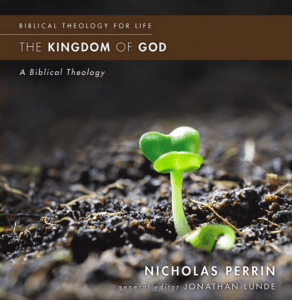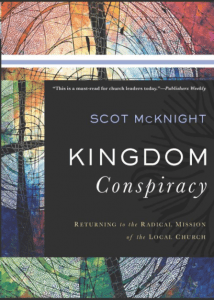Chapters 1-2 Review for Scot McKnight, Kingdom Conspiracy: Returning to the Radical Mission of the Local Church (Grand Rapids, MI: Brazos, 2014).
There is, at almost every level of Christian life in America, a tension rising to surface between people’s understanding of the meaning of Jesus’ kingdom. Is the division meres semantics? Is it sociological? Is the difference geographical (urban versus rural)? Or denominational (conservative versus progressive)? Maybe it’s blogological (as in, whose blog/Tumblr you read -McKnight, Piper, Driscoll, Bell?)
Is such tension even an actual element of the contours of faith found in the sacred pages of the New Testament? Our friend, trusted scholar, and advocate for local churches, Scot McKnight, has written a book (Kingdom Conspiracy, release date: October) which surgically probes the rising rift between those who fundamentally understand Jesus’ kingdom to have different expression, shape, and meaning.
McKnight calls this rift skinny jeans kingdom people versus pleated pants kingdom people. The former representing those women and men who espouse a view which essentially is built upon the premise that (direct quote) . . .
Kingdom means
good deeds
done by good people (Christian or not)
in the public sector
for the common good.
Entirely accurate or not, McKnight goes on to accurately name to unhealthy trajectories such an approach (skinny jeans) leads to. His analysis here is spot on. And it’s happening right before our Western eyes.
Pleated pants kingdom people (who presumably are as suspicious of skinny jeans kingdom people as as skinny jeans kingdom people are of them) have major reservations with the central thesis that the kingdom Jesus preached and lived is primarily about good deeds for the common good. It’s not, we should hope, that pleated pants kingdom people are against good deeds, good people, or the public nature of religion. Rather, the pleated pants person desires a certain particularity to what we mean when we say Jesus is the hope of the world. Pleated pants kingdom people (can I shorten it to PPKP? Never mind.), according to McKnight, pleated plants kingdom people “…have produced shelves of books exclaiming what the Bible teaches about the kingdom.”
As I’m want to do, this is a fairly complicated issue. First, I think the real issue is people who think about Jesus primarily in terms of the Gospel (an event that happened a long time ago; an event I respond to) versus people who see the kingdom as a daily happening of God’s love and justice on display. Second, I see some healthy tension within the pages of the New Testament. This tension is best exemplified between the Synoptic Gospels (Mark, Matthew, and Luke) and the major writings of St. Paul. Namely, it’s a tension between Jesus’ kingdom and Paul’s church. Ultimately, I believe the NT resolves this, but deeper work is required. A surface or cursory readings of these two elements of the NT can lead one to the stark realizations that Jesus talked about the kingdom, kingdom of God, kingdom of heaven more than any other subject. Whereas Paul talks as rarely about the kingdom as Jesus does the church. Moreover, Jesus even defines the gospel (Mark 1:14-15) in terms of the kingdom. That is, he doesn’t even attempt to define/describe the good news separate from the basic tenet of kingdom linguistics. Add to this that there are many in evangelical circles who have almost no linguistic space or imagination for a kingdom conversation, and the water gets real muddy real quick.
Are you thoroughly confused yet?
Confession. I’m 35 years old. I probably lean towards the skinny jeans kingdom person category though I’ve never technically had the courage to actually wear literal skinny jeans. And I stopped wearing the occasional pleated pant when the young adult minister on our church staff asked me to (he also asked me to stop going to the dry cleaners, the metaphors are endless!). I find McKnight’s work in this new release terribly clarifying. He’s holding a mirror up to local churches, like a doctor does for a patient, saying, “Here’s what is really going on? It’s not just about preaching style? Or where the money is spent or what songs are selected for worship? Those are mere symptoms.”
Another thing McKnight teaches us. Language matters. We need to hand out local church lexicons perhaps. Is it too simplistic to say the gospel, church, and kingdom are best understood in relationship to each other, not in disagreement? The gospel–literally news that is good–is the announcement that, in Jesus and Jesus’ church, the intent of God (insert kingdom, rule, reign) is interrupting the things of earth with the things of heaven. The church is the local act of women and men who announce the alternative invitation from Jesus to a different kind of life. The gospel is the pronouncement of the event/experiences of heaven; what we know as the kingdom of God. The church sees this happening first and names it. As so many (including McKnight) note, Stanley Hauerwas precisely states the mission of all kingdom people living out the kingdom ethic of Jesus in a local church when he wrote, “For the church to be the church, therefore, is not anti-world, but rather an attempt to show what the world is meant to be as God’s good creation.”
Skinny jeans kingdom people and pleated pants kingdom people can drink to that. Even if one is drinking a mircobrew from East Nashville while the other drinks a Diet Coke.
Josh Graves is the lead minister for the Otter Creek Church in Nashville, TN. He is author of The Feast (2009), Heaven on Earth (2012), and How Not to Kill a Muslim (Cascade, 2015). You can also follow him twitter @joshgraves.











